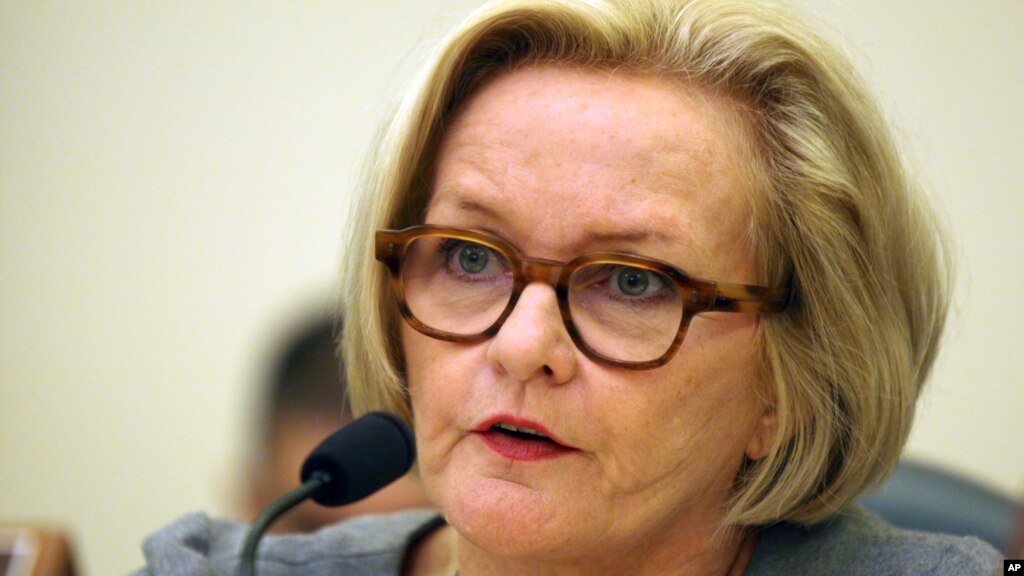
United States lawmakers have begun considering the international agreement to restrict Iran’s nuclear activities. Some members of Congress are still uncommitted on the nuclear deal. They say they have yet to be persuaded on whether to vote for or against it.
On Sunday, a member of the U.S. Senate said she does not believe she or other uncommitted lawmakers are under any pressure from either side in the debate. Senator Claire McCaskill is from Missouri and belongs to the Democratic Party -- the same party as President Barack Obama.
Also on Sunday, Mr. Obama warned that Congressional rejection of the deal would make it harder to keep Iran from getting nuclear weapons.
Democratic Senator Claire McCaskill has yet to announce her position on the agreement. She says she is reaching out to diplomats of countries holding Iranian money and other assets. She wants to know if they will continue to respect international sanctions on Iran if the U.S. Congress votes against the deal:
“That money is held primarily in India, China, South Korea (and) Japan. So, I’m on the phone to those countries, those embassies, those ambassadors, asking them the question, ‘What will you do if the United States walks away? Will Iran get this money anyway?’ "
If these countries enforce the international restrictions on Iran, should the Congress vote down the agreement? Would that make her more likely to vote against it?
“It’s not a perfect deal, obviously. We don’t trust Iran, but I think too many people are judging this deal against the status quo, not what the new situation would be on the world stage. Remember, the world is united in this deal, so it’s going to have to be a status quo where the rest of the world also stays united or sanctions regime will just fall apart.”
Last week, New York Senator Charles Schumer announced his opposition to the nuclear agreement. Mr. Schumer is a leading Democrat. Senator McCaskill says she does not feel pressured to make a decision by either side.
"I don’t think any of us feel pressured, either by Chuck Schumer’s rejection of this deal or the president’s full-throated support... I hope my colleagues are doing what I’m doing and that is doing our homework. One of the things that was most disappointing was the (majority) Republicans insisted on 60 days to review this deal."
Ms. McCaskill criticized the Republican Party for making a hurried decision on the deal.
"It appeared to me most of them made their minds up in five minutes, and so I think this is one where the heightened rhetoric on both sides is not always helpful and I hope that more senators keep their blinders on, do their homework and figure out which way do we secure Israel and secure our country."
President Obama was questioned late Friday for a show that CNN broadcast on Sunday. The president said that studies show a majority of Americans are against the nuclear deal because they do not have all the facts. He called it a complicated agreement, with a country where demonstrators chant “Death to America.” But he said those who know most about the difficulty of keeping Iran from getting nuclear weapons support it.
Mr. Obama said congressional opponents of the agreement have a lot in common with those in Iran who want to limits contacts between the two countries. He said those who have announced their opposition before reading the agreement are not interested in the substance of the issue, but the politics of it.
And, he warned congressional rejection would make it harder to keep Iran from getting nuclear weapons.
Mr. Obama said the international unity resulting from the agreement would come apart. He said that would not just be on sanctions, but also on opinions about U.S. leadership, and who is responsible for the dispute between the U.S. and Iran.
Next month, U.S. lawmakers are expected to vote on whether to approve or disapprove the international nuclear agreement with Iran. If they reject the deal, Mr. Obama has threatened to veto such a vote. That would mean that then both houses of Congress would have to come up with a two-thirds vote to override, or cancel, the veto.
I’m Anne Ball.
VOA’s Victor Beattie reported this story from Washington. Anne Ball adapted it for Learning English. George Grow was the editor.
Words in This Story
asset (s) – n. a valuable thing, such as money, property or stock shares
sanction (s) – n. action taken or an order that given to force a country to obey international laws by limiting or stopping trade with that country
status quo – n. the way things are now
complicated – adj. hard to understand or explain
chant (s) – v. say something many times in a rhythmic way usually loudly and in a group
challenge – n. to say or show that (something) may not be true, correct, or legal





